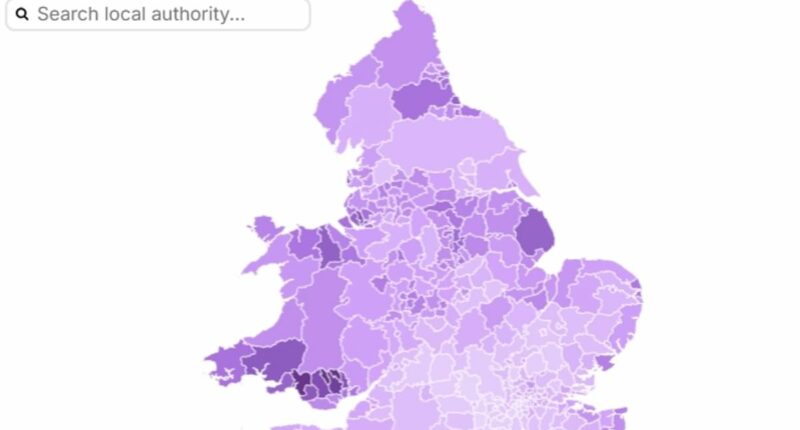Share this @internewscast.com
In certain regions of the UK, nearly 10% of residents qualify to lease a vehicle through the debated Motability program.
Originally established to aid those with severe physical disabilities in maintaining mobility, the Motability scheme has expanded and now includes individuals with a broad range of conditions, from anxiety and depression to back pain.
The program extends eligibility to those receiving the enhanced mobility component of the Personal Independence Payment (PIP), a benefit designed to assist with the additional expenses associated with disabilities or health issues.
Recipients of this enhanced PIP can elect to exchange part of their allowance for a new vehicle, scooter, or powered wheelchair.
An investigation by the Daily Mail highlights the ten regions in England and Wales with the highest percentages of enhanced PIP beneficiaries who are potentially eligible to claim a vehicle.
Leading the list is Blaenau Gwent in southeast Wales, where 7.4% (4,999 individuals) of the population receive this benefit. Notably, seven other Welsh areas also rank in the top ten, while Knowsley in Merseyside holds the fifth spot with a claim rate of 6.2%.
Blackpool came tenth, with 5.6 per cent of residents (8,112) on enhanced PIP.
The Conservatives have repeatedly accused Labour of allowing PIP claims to ‘spiral out of control’ under their watch.
The cost of Motability – which accounts for more than one in five new cars sold in Britain – increased by almost 10 per cent from £2.8billion to £3.074billion last year.
Chancellor Rachel Reeves is eyeing up Motability as she seeks to fill a £30billion black hole in public finances in her Budget later this month.
The Department for Work and Pensions (DWP) does not directly fund Motability, but the scheme allows disability benefits claimants to directly exchange their mobility allowance for a new car.
By handing over £60 of their weekly PIP mobility benefit, a claimant can find themselves driving away with an all-electric Dacia Spring – retail price £15,000 – for no upfront cost.
In exchange for the full £75.75 weekly allowance, a claimant can ‘purchase’ a petrol Nissan Juke SUV – retail price £23,000.
For people in dire need of assistance with transportation owing to a disability, these vehicles can be essential to their physical and mental wellbeing.
But it becomes less clear as to the immediate benefits to the taxpayer when you look further down the list of vehicles purchased by Motability – which enjoys zero VAT on the hire and resale of its vehicles.
For an upfront payment of £7,999, customers can walk away with a brand-new BMW i4 M Sport, which retails at £50,000 and accelerates from 0-60mph in five seconds, or, for the same upfront price, a Mercedes-Benz CLA Coupe.
Once the lease on a vehicle is up, Motability sells it on the open market, with the profits going back into the company.
Motability’s 860,000 users are also exempt from paying VAT or insurance premium tax on their leased vehicles.
Scrutiny of Motability has grown as use of the scheme has exploded by a third since 2017, with people qualifying for new cars for conditions including tennis elbow, ADHD and anxiety.
The cost of the scheme last year emerged in a written parliamentary question to disability minister Sir Stephen Timms.
Asked how much funding the DWP has provided to the Motability Scheme in the last year, he said: ‘The Motability Scheme receives no direct funding from DWP. However, it does receive the direct transfer of benefit from DWP.
‘This is claimant benefit the claimant would otherwise be receiving, and the cost of transfer is paid for by the Motability Foundation.
‘The total value of benefits transferred to Motability in financial year 2024–2025 the Department for Work and Pensions was £3,074,920,421.67.’
A DWP spokesman said: ‘Motability is independent of government and is wholly responsible for the terms and administration of the Scheme, including determining what types of vehicles they use.
‘The scheme comes at no additional cost to the taxpayer, and customers claiming benefits such as PIP must use some of their existing payment to lease a car.’

Motability cars can be leased by benefits claimants who receive an enhanced rate for qualifying mobility difficulties (file photo)
A spokesperson for Motability said: ‘The Motability Scheme exists to meet the needs of disabled people – giving them the freedom to get to work, attend school, medical appointments, and live independently.
‘The Scheme is not only life-changing for customers but delivers real value to the UK economy – generating £1.50 in economic benefit for every £1 of disability allowance spent.
‘It operates fully off the UK Government’s balance sheet, with no additional direct funding from the taxpayer beyond the allowances provided to disabled people.’















